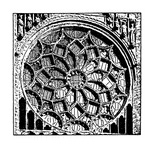
A Catholic Response to Sola Fide
JUSTIFICATION: BY FAITH ALONE?
A central doctrine of the Protestant Reformation is justification by faith alone (sola fide). Though different Protestant denominations interpret and expound this doctrine in different senses, the general consensus among Protestants remains that man is justified — i.e., made right with God — by faith alone, and that, whatever role good works may occupy in man’s life, they are not, even partially, the basis of his justification before God. Though sola fide is widely popular, and alluring even for many who do not espouse it, it is alien and contrary to the teaching of Holy Scripture viewed in its entirety, as well as to the teaching of the Church Christ Himself founded 2,000 years ago, the Catholic Church.
Granted, there is much Scripture that, read in isolation, seems to suggest at least the possibility, if not the probability, of justification by faith alone. Protestantism has been so successful and so influential for so long that its apologists have been able to devise various seemingly cogent arguments in favor of sola fide. However, they generally cite scriptural passages that attest to the seeming probability of sola fide exclusively; if they attempt to account for any of the vast number of passages that undermine the doctrine, a strained effort is made to subordinate such passages to the other, favored set.
It is my task here to address the misconceptions of the Catholic doctrine of Justification, particularly as it harmonizes with Holy Scripture, and to show how the scriptural passages cited in favor of sola fide are to be understood properly in the wider context of both the Old and New Testaments. While the subject’s complexity prohibits treating every pertinent issue, we will endeavor to address several common difficulties pertaining to the Catholic Church’s doctrine of Justification by faith. It must be stressed at the outset that while the Catholic Church does not teach justification by faith alone, she most certainly teaches justification by faith. However, following Christ, as well as St. Paul and the other New Testament writers, the Catholic Church insists that faith alone is insufficient.
Effective communication between Catholics and Protestants on the subject of justification by faith is often hindered by Catholics’ failing to draw necessary distinctions and patiently to recount important nuances reflected in the scriptural texts cited. Often, such omissions reinforce the suspicion that Catholics are insufficiently familiar with Scripture, while the Catholic party contends that his case is inadequately appreciated. (Often, it is inadequately articulated.) Therefore, it is necessary to take careful note of the Catholic resolution of various Protestant difficulties drawn from several controversial scriptural passages.
You May Also Enjoy
Christ’s answer to the Sadducees does not indulge the misunderstandings that underlie their question but points us back to what is fundamental.
Ever since The Da Vinci Code became a bestseller, the interest in "alternative gospels" and Gnostic writings has spiked among modern readers.
The grace of marriage allows the parties to become one flesh and calls forth from them the same love Christ has for His Church.

